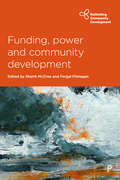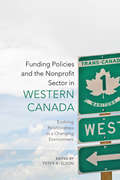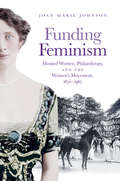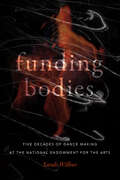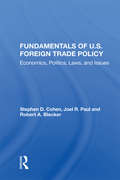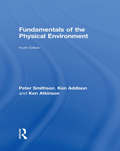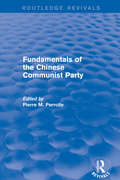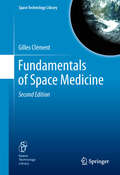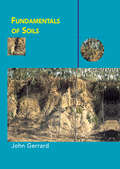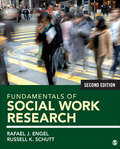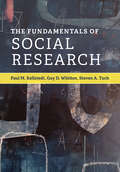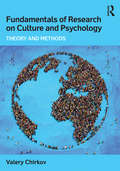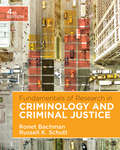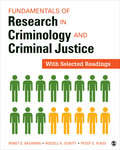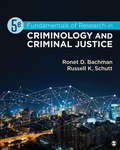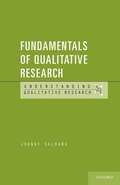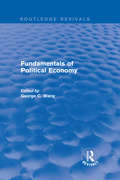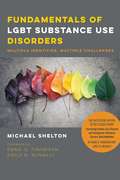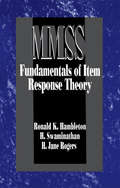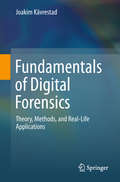- Table View
- List View
Funding, Power and Community Development
by Niamh McCrea and Fergal FinneganThis edited collection critically explores the funding arrangements governing contemporary community development and how they shape its theory and practice. International contributions from activists, practitioners and academics consider the evolution of funding in community development and how changes in policy and practice can be understood in relation to the politics of neoliberalism and contemporary efforts to build global democracy from the ‘bottom up’. Thematically, the collection explores matters such as popular democracy, the shifting contours of the state-market relationship, prospects for democratising the state, the prospects for community autonomy, the effects of managerialism and hybrid modes of funding such as social finance. The collection is thus uniquely positioned to stimulate critical debate on both policy and practice within the broad field of community development.
Funding Policies and the Nonprofit Sector in Western Canada: Evolving Relationships in a Changing Environment
by Peter R. ElsonFunding Policies and the Nonprofit Sector in Western Canada offers a detailed yet accessible account of nonprofit funding policies in a region characterized by fiscal conservatism, a cyclical resource-based economy, and a growing share of Canada's population and GDP.The chapters in this collection offer compelling and candid analyses of the realities of nonprofit funding in Western Canada. Each combines practical insights with academic rigour, providing critical historical context and an up-to-date profile of funding for services. For each province, a leading practitioner has provided an insider perspective into a specific regime or organization: nonprofit housing in British Columbia; the politics of social policy in Alberta; sport, culture, and recreation, and lottery funds in Saskatchewan; and community economic development in Manitoba.Written by leading researchers and practitioners, Funding Policies and the Nonprofit Sector in Western Canada offers a solid foundation on which policymakers, scholars, and practitioners alike can examine the challenges and opportunities of the contemporary funding environment.
Funding Feminism: Monied Women, Philanthropy, and the Women’s Movement, 1870–1967 (Gender and American Culture)
by Joan Marie JohnsonJoan Marie Johnson examines an understudied dimension of women's history in the United States: how a group of affluent white women from the late nineteenth through the mid-twentieth centuries advanced the status of all women through acts of philanthropy. This cadre of activists included Phoebe Hearst, the mother of William Randolph Hearst; Grace Dodge, granddaughter of Wall Street "Merchant Prince" William Earle Dodge; and Ava Belmont, who married into the Vanderbilt family fortune. Motivated by their own experiences with sexism, and focusing on women's need for economic independence, these benefactors sought to expand women's access to higher education, promote suffrage, and champion reproductive rights, as well as to provide assistance to working-class women. In a time when women still wielded limited political power, philanthropy was perhaps the most potent tool they had. But even as these wealthy women exercised considerable influence, their activism had significant limits. As Johnson argues, restrictions tied to their giving engendered resentment and jeopardized efforts to establish coalitions across racial and class lines. As the struggle for full economic and political power and self-determination for women continues today, this history reveals how generous women helped shape the movement. And Johnson shows us that tensions over wealth and power that persist in the modern movement have deep historical roots.
Funding Bodies: Five Decades of Dance Making at the National Endowment for the Arts
by Sarah WilburFive Decades of Dance Making at the National Endowment for the Arts
Fundamentals Of U.s. Foreign Trade Policy: Economics, Politics, Laws, And Issues
by Stephen D. CohenThis unique text integrates for the first time the three critical aspects of U.S. foreign trade policy formulation and implementation: economics, politics, and laws. In a comprehensive and nonjudgmental manner, a political scientist, an economist, and a legal scholar combine efforts to present a well-rounded view of the nature and impact of trade p
Fundamentals of the Physical Environment: Fourth Edition
by Peter Smithson Ken Addison Ken AtkinsonFundamentals of the Physical Environment has established itself as a well-respected core introductory book for students of physical geography and the environmental sciences. Taking a systems approach, it demonstrates how the various factors operating at Earth’s surface can and do interact, and how landscape can be used to decipher them. The nature of the earth, its atmosphere and its oceans, the main processes of geomorphology and key elements of ecosystems are also all explained. The final section on specific environments usefully sets in context the physical processes and human impacts. This fourth edition has been extensively revised to incorporate current thinking and knowledge and includes: a new section on the history and study of physical geography an updated and strengthened chapter on climate change (9) and a strengthened section on the work of the wind a revised chapter (15) on crysosphere systems - glaciers, ice and permafrost a new chapter (23) on the principles of environmental reconstruction a new joint chapter (24) on polar and alpine environments a key new joint chapter (28) on current environmental change and future environments new material on the Earth System and cycling of carbon and nutrients themed boxes highlighting processes, systems, applications, new developments and human impacts a support website at www.routledge.com/textbooks/9780415395168 with discussion and essay questions, chapter summaries and extended case studies. Clearly written, well-structured and with over 450 informative colour diagrams and 150 colour photographs, this text provides students with the necessary grounding in fundamental processes whilst linking these to their impact on human society and their application to the science of the environment.
Fundamentals of the Chinese Communist Party (Routledge Revivals)
by Pierre M. PerrolleThis title was first published in 1976. From 1966 to 1969 the large-scale political turmoil and intense conflicts of the Cultural Revolution in China shattered notions of institutional permanence and unshakable legitimacy that many analysts had come to associate with the Communist Party of China, which had ruled the People's Republic for over fifteen years. Just as the high-level bureaucrats of the Party were shaken from their complacency, it seemed for a time, from the outside, as though it could no longer be taken for granted that the Communist Party would continue to provide the institutional core for political leadership in China. Fundamentals of the Party (Tang ti chi-ch'u chih-shih), which we are translating and publishing here as Fundamentals of the Chinese Communist Party, was published by the Shanghai People's Press in 1974 and constitutes an important source of the type needed to study the revival of the Party.
Fundamentals of Space Medicine
by Gilles ClémentInvestigations in space have led to fundamental discoveries of the human body to the space environment. Gilles Clément has conducted extensive research in this field. This readable text presents the findings from the life science experiments conducted during and after space missions. About 1200 human space flights have been completed to date, including more than 500 astronauts from various countries, for a combined total presence in space of about 90 years. The first edition of this title was published in 2005 (written in 2003 - 2004), and new data is now available from crewmembers participating in long-duration flights on board the International Space Station (ISS). The number of astronauts who have spent six months in orbit has doubled since 2004. On board the ISS, the astronauts use newly developed pharmaceutical countermeasure for bone loss (such as biophosphonates) and state-of-the-art exercise resistive devices against muscle atrophy and cardiovascular deterioration. The ISS life support systems now use advanced closed-loop systems for meeting the needs of a 6-person crew, including recycling urine to water. Some of these new technologies have potential spin-offs for medical (i.e., sedentary life style, obesity) and environmental issues here on Earth. And finally, there are new space research opportunities with the Orion space vehicle that will soon replace the Space Shuttle, the Moon, and Mars space exploration program that is slowly but surely taking shape, and the space tourism sector that has become a reality. The focus on this edition is the ISS, Orion and planetary exploration, and space tourism. This edition also includes more than 20% new material, along with photographs, data, and video clips for Springer Extras!
Fundamentals of Soils (Routledge Fundamentals of Physical Geography)
by John GerrardFundamentals of Soil provides a comprehensive and engaging introduction to soils and the workings of soil systems. This text is the only one of its kind to provide an attractive, lively and accessible introduction to this topic. Featuring learning tools within each chapter, such as summaries, essay questions and guides for further reading, the text is also highly illustrated with useful tables, boxes and figures. Covering all key areas of study at an introductory level, subjects covered include:· Soil properties· Soil processes· Controls on soil formation· Soil classification· World soils· Soil patterns· Soil degradation.
Fundamentals of Social Work Research
by Rafael J. Engel Russell K. SchuttDesigned to help students develop skills in evaluating research and conducting studies, this brief version of Rafael J. Engel and Russell K. Schutt’s popular, The Practice of Research in Social Work, makes principles of evidence-based practice come alive through illustrations of actual social work research. With integration of the CSWE Competencies, the text addresses issues and concerns common to the discipline and encourages students to address diversity and ethics when planning and evaluating research studies. The Second Edition includes a focus on qualitative research, a new chapter on research ethics, new sections on mixed methods research and community-based participatory research, and more.
The Fundamentals of Social Research
by Paul M. Kellstedt Guy D. Whitten Steven A. TuchThis textbook provides an introduction to the scientific study of sociology and other social sciences. It offers the basic tools necessary for readers to become both critical consumers and beginning producers of scientific research on society. The authors present an integrated approach to research design and empirical analyses in which researchers can develop and test causal theories. They use examples from social science research that students will find engaging and inspiring and that will help them to understand key concepts. The book makes technical materials accessible to students who might otherwise be intimidated by mathematical examples. This new text, with the addition of sociologist Steven A. Tuch to the author team, follows the successful format, approach, and pedagogical features in Paul M. Kellstedt and Guy D. Whitten's bestselling text, The Fundamentals of Political Science Research, now in its third edition. Workbooks in Stata, SPSS, and R, three of the most popular statistical analysis programs, are available as separate purchases to accompany this textbook, enabling students to connect the lessons of this book to hands-on applications of the software.
Fundamentals of Research on Culture and Psychology
by Valery ChirkovThis is the first book that provides detailed guidelines of how to conduct multi-disciplinary research to study people's behaviors in different cultures. Readers are encouraged to look beyond disciplinary boundaries to address issues between individuals and their socio-cultural environments so as to design the most effective studies possible. The core philosophical and theoretical assumptions that underlie the strategies, designs, and techniques used when researching cultural issues are examined. The book reviews all the steps that go into doing cultural research from formulating the research problem to selecting the most appropriate method for data analysis. Realist and interpretivist paradigms together with the theory of cultural models and quantitative, qualitative, mixed-method, and multiple-design strategies are reviewed. Case studies, ethnographies, and interviewing techniques are emphasized throughout. Chapters open with learning objectives and end with a conclusion, a glossary, questions, exercises, and recommended readings. Numerous multidisciplinary examples, tables, and figures demonstrate and synthesize the analysis of data. Information boxes provide historical notes and how-to boxes provide tips on methodological issues. Highlights include: -Encourages researchers to breach disciplinary boundaries to address the problems of human functioning in different cultures (Chs. 1 & 2). -Introduces readers to the theory of cultural models that helps bridge the human mind and socio-cultural realities (Chs. 2 & 10). -Propagates the realist and interpretivist philosophical paradigms for doing cultural studies and demonstrates how to use these approaches when studying people in different cultures (Chs. 3 & 4). -Helps readers formulate productive research questions, articulate concepts, and understand the role theories play in cultural research (Ch. 5 - 6). -Reviews research designs including case-based and variable-based ones, person-centered ethnography, interviewing, and quantitative studies (Chs. 7 - 10). -www.routledge.com/9780415820325/ provides instructors with Power Points, additional references and studies, and questions for discussion and evaluation for each chapter and students with chapter outlines and objectives, key terms and concepts with a hotlink to the definition, and suggested readings and websites. Part 1 explores disciplinary and theoretical thinking to help readers connect different disciplines, theories, and philosophical paradigms in a logical way. Part 2 reviews planning research with an emphasis on defining the research problem. Here readers learn to articulate the purpose of the study and the research questions, work with related conceptual and theoretical foundations, and identify various research strategies including nomothetic and idiographic approaches, variable- and case-based studies, and potential sampling problems. Part 3 reviews the practical aspects of doing cultural research -- how to use various research designs including experimental, quasi-experimental, correlational studies, mixed method designs, and ethnographic and qualitative studies. Methodological problems specific to researching cultural issues such as the equivalence of concepts, the translation of instruments, and verifying measurement invariance are reviewed. Readers are also introduced to ethnography including practical elements such as language training, formal document requirements, and issues related to working in an unfamiliar community. The book concludes with the most crucial aspects of conducting ethical cultural psychological research. Intended for advanced undergraduate or graduate courses that conduct cultural or cross-cultural research including cross-(cultural) psychology, culture and psychology, or research methods/design courses in psychology, anthropology, sociology, cultural studies, social work, education, geography, international relations, business, nursing, public health, and communication, the book also appeals to researchers interested in conducting cross-cultural and cultural studies. Pre...
Fundamentals of Research in Criminology and Criminal Justice
by Ronet D. Bachman Russell K. SchuttFundamentals of Research in Criminology and Criminal Justice, Fourth Edition introduces students to the multifaceted subject of research methods and shows them why research is important in the field of criminology and criminal justice. This brief version of Ronet Bachman and Russell K. Schutt’s successful textbook (The Practice of Research in Criminology and Criminal Justice) simplifies complex concepts with real-world research examples found in everyday experiences in the criminology and criminal justice professions. The thoroughly updated Fourth Edition of this bestseller reflects the most recent developments in research methods, including the use of big data, increased coverage of crime mapping, evidence-based and web-based research, along with the most current research examples impacting the field. This is an excellent introductory text for undergraduate research courses, and is ideal for students who want to understand how and why criminal justice research is done to become critical consumers of research.
Fundamentals of Research in Criminology and Criminal Justice: With Selected Readings
by Ronet D. Bachman Russell K. Schutt Margaret Peggy PlassFundamentals of Research in Criminology and Criminal Justice: With Selected Readings, by well-known researchers Ronet D. Bachman, Russell K. Schutt, and Peggy S. Plass, is a unique resource for understanding the multifaceted subject of research methods in the field of criminology and criminal justice, amply illustrated by carefully selected and edited research articles from the leading journals in the field. Each of these articles features an introduction, written to draw the student’s attention to the specific concept(s) from the chapter that are illustrated in the article, and a series of questions about the article, designed to help the student think critically about and reflect on these concepts. In this way, students not only learn how to conduct research, but also learn why it is important to do so. Building off the widely adopted Fundamentals of Research in Criminology and Criminal Justice, the additional readings increase students’ understanding of complex issues being investigated in the field today and how those issues are being researched. Additional instructor resources and study tools can be found online at study.sagepub.com/bachmanfrccjsr.
Fundamentals of Research in Criminology and Criminal Justice
by Russell K. Schutt Ronet D. BachmanFundamentals of Research in Criminology and Criminal Justice, Fourth Edition introduces students to the multifaceted subject of research methods and shows them why research is important in the field of criminology and criminal justice. This brief version of Ronet Bachman and Russell K. Schutt’s successful textbook (The Practice of Research in Criminology and Criminal Justice) simplifies complex concepts with real-world research examples found in everyday experiences in the criminology and criminal justice professions. The thoroughly updated Fourth Edition of this bestseller reflects the most recent developments in research methods, including the use of big data, increased coverage of crime mapping, evidence-based and web-based research, along with the most current research examples impacting the field. This is an excellent introductory text for undergraduate research courses, and is ideal for students who want to understand how and why criminal justice research is done to become critical consumers of research.
Fundamentals of Research in Criminology and Criminal Justice
by Russell K. Schutt Ronet D. BachmanFundamentals of Research in Criminology and Criminal Justice introduces students to the multifaceted subject of research methods and shows them why research is important in the field. This brief version of Ronet D. Bachman and Russell K. Schutt&’s best-selling The Practice of Research in Criminology and Criminal Justice simplifies complex concepts with real-world research examples found in everyday experiences in the criminology and criminal justice professions. The thoroughly revised Fifth Edition retains its celebrated strengths while breaking new ground with coverage of recently popular research methods and contemporary research findings.
Fundamentals of Research in Criminology and Criminal Justice
by Russell K. Schutt Ronet D. BachmanFundamentals of Research in Criminology and Criminal Justice introduces students to the multifaceted subject of research methods and shows them why research is important in the field. This brief version of Ronet D. Bachman and Russell K. Schutt&’s best-selling The Practice of Research in Criminology and Criminal Justice simplifies complex concepts with real-world research examples found in everyday experiences in the criminology and criminal justice professions. The thoroughly revised Fifth Edition retains its celebrated strengths while breaking new ground with coverage of recently popular research methods and contemporary research findings.
Fundamentals of Research in Criminology and Criminal Justice: With Selected Readings
by Russell K. Schutt Margaret Peggy Plass Ronet D. BachmanFundamentals of Research in Criminology and Criminal Justice: With Selected Readings, by well-known researchers Ronet D. Bachman, Russell K. Schutt, and Peggy S. Plass, is a unique resource for understanding the multifaceted subject of research methods in the field of criminology and criminal justice, amply illustrated by carefully selected and edited research articles from the leading journals in the field. Each of these articles features an introduction, written to draw the student's attention to the specific concept(s) from the chapter that are illustrated in the article, and a series of questions about the article, designed to help the student think critically about and reflect on these concepts. In this way, students not only learn how to conduct research, but also learn why it is important to do so. Building off the widely adopted Fundamentals of Research in Criminology and Criminal Justice, the additional readings increase students' understanding of complex issues being investigated in the field today and how those issues are being researched. Additional instructor resources and study tools can be found online at study.sagepub.com/bachmanfrccjsr.
Fundamentals of Qualitative Research (Understanding Qualitative Research Series)
by Johnny SaldanaFundamentals of Qualitative Research approaches qualitative inquiry as a strategically selected composite of genres, elements, and styles. Saldaña, author of the bestselling book, The Coding Manual for Qualitative Researchers, brings clear writing and explanatory prowess to this new textbook for learning the fundamentals of qualitative research methods. <p><p>This book presents a concise yet rigorous description of how to design and conduct fieldwork projects and how to examine data in multiple ways for interpretive insight. Saldaña, a master teacher and qualitative data analyst, acquaints readers with the major genres of qualitative research available and the elements of interviewing, participant observation, and other data collection methods to inform emergent research design decisions. An extended chapter on qualitative data analysis is one of the book's unique features. Saldaña devotes necessary coverage to conceptual foundations, coding, analytic memo writing, thematic analysis, assertion development, grounded theory, narrative and poetic inquiry, and ethnodramatic approaches to the data. Eight distinctive styles of qualitative writing are presented. The book concludes with a list of recommended readings in the field, as well as additional resources on organizations and associations dedicated to qualitative research. <p><p>Fundamentals of Qualitative Research is an ideal introduction for advanced undergraduate and graduate students in education, sociology, psychology, anthropology, human communication, and health care.
Fundamentals of Psychodrama
by Falko von Ameln Jochen Becker-EbelThis book offers a comprehensive guide to psychodrama, including the underlying philosophy, methodology, theory and applications. Taking readers through the process of staging a psychodrama session, from the contracting phase, exploration and enactment to closure and integration, the book also presents brief short examples to illustrate how to choose the best methodological approach for any context, and describes in detail the various psychodrama techniques and their application in practice, with indications, contraindications, typical pitfalls and FAQs. The book demonstrates that psychodrama is not merely a collection of methods and techniques and that the potential of psychodrama cannot be fully utilized without an in-depth knowledge of its conceptual foundations. With examples from a range of practices, it shows the broad applicability of psychodrama in therapeutic and non-therapeutic contexts alike, e.g. in educational contexts (school and adult education), social work, organization development, coaching and many other fields. This easy-to-read book uses jargon-free language and will appeal to psychotherapy researchers and practitioners, as well as non-therapeutic professionals like human resource consultants and life coaches. This is a translated and revised edition of the best-selling German book Psychodrama: Grundlagen (Springer, 2014, 3rd edition).
Fundamentals of Political Economy (Routledge Revivals)
by Xiaohu (Shawn) Wang K K FungThis title was first published in 1977
Fundamentals of LGBT Substance Use Disorders: Multiple Identities, Multiple Challenges
by Michael Shelton?In this new book, the successor to the classic in the field Counseling Lesbian, Gay, Bisexual, and Transgender Substance Abusers: Dual Identities by Dana G. Finnegan and Emily B. McNally, Michael Shelton reviews the empirical literature and synthesizes what we know about the prevalence of LGBT substance use, abuse, and treatment availability, emphasizing the need for affirmative therapeutic practices. The principles of trauma-informed and culturally competent treatment/intervention are explained and assessed, as well as the challenges of minority stress and microaggressions experienced by the LGBT population. Separate sections focus on the sub-populations of lesbians, gay men, bisexuals, and transgender individuals. Separate chapters focus on LGBT youth, the elderly, family constellations and concerns, criminal justice issues, and rural LGBT substance abuse. This volume provides an introduction to the field that will be useful both as a primary textbook and as a handbook/reference for LGBT-focused and general substance-use disorder clinics and their administrators, clinicians, trainees, allies and volunteers.
Fundamentals of Item Response Theory (Measurement Methods for the Social Science)
by Ronald K. HambletonUsing familiar concepts from classical measurement methods and basic statistics, Hambleton and colleagues introduce the basics of item response theory (IRT) and explain the application of IRT methods to problems in test construction, identification of potentially biased test items, test equating, and computerized-adaptive testing. The book also includes a thorough discussion of alternative procedures for estimating IRT parameters, such as maximum likelihood estimation, marginal maximum likelihood estimation, and Bayesian estimation in such a way that the reader does not need any knowledge of calculus to follow these explanations. Including step-by-step numerical examples throughout, the book concludes with an exploration of new directions in IRT research and development.
Fundamentals of Feminist Gerontology
by J Dianne GarnerExplore feminist ideals and advocacy for aging women in health care, home life, work, and retirement! Fundamentals of Feminist Gerontology strives to increase women’s self-esteem and their overall quality of life by encouraging education and by putting a stop to age, sex, and race discrimination. As a student or professional in psychology, social work, or gerontology, you will learn about feminist conceptions of retirement, economic issues, psychological issues, and social issues and will explore studies on old age discrimination and devaluation and sexism toward women in Western societies to gain an understanding of the experiences of these women. This book also shows how some women are experiencing empowerment through alternative health care, such as mind-body therapies, homeopathy, aromatherapy, and herbal medicine and examines older women in the family context. Fundamentals of Feminist Gerontology will provide you with the tools to offer effective therapy to women to help them improve their own lives. For a complete list of contents, please visit our Web site at www.haworthpressinc.com.Using feminist practice approaches, Fundamentals of Feminist Gerontology gives you real-life situations and examples that will raise awareness of the issues that rob older women of the quality of life they deserve. Some of the vital issues and theories you will read about in Fundamentals of Feminist Gerontology include: women regaining control over their health care retirement and the economic issues that older women face when they retire the role of children and grandchildren in the older woman’s life unpaid work after retirement in the home and as a care provider older women battling domestic violence financial and psychological issues of widowhood special concerns of minority women and lesbians as they grow olderFundamentals of Feminist Gerontology presents new feminist knowledge and strategies to assist aging women in fully developing, enhancing, and enjoying their later years. You will discover a rich variety of theories and frameworks from a multitude of intellectual paradigms and political positions to enhance your professional practice with older women.
Fundamentals of Digital Forensics: Theory, Methods, and Real-Life Applications
by Joakim KävrestadThis hands-on textbook provides an accessible introduction to the fundamentals of digital forensics. The text contains thorough coverage of the theoretical foundations, explaining what computer forensics is, what it can do, and also what it can’t. A particular focus is presented on establishing sound forensic thinking and methodology, supported by practical guidance on performing typical tasks and using common forensic tools. Emphasis is also placed on universal principles, as opposed to content unique to specific legislation in individual countries.Topics and features: introduces the fundamental concepts in digital forensics, and the steps involved in a forensic examination in a digital environment; discusses the nature of what cybercrime is, and how digital evidence can be of use during criminal investigations into such crimes; offers a practical overview of common practices for cracking encrypted data; reviews key artifacts that have proven to be important in several cases, highlighting where to find these and how to correctly interpret them; presents a survey of various different search techniques, and several forensic tools that are available for free; examines the functions of AccessData Forensic Toolkit and Registry Viewer; proposes methods for analyzing applications, timelining, determining the identity of the computer user, and deducing if the computer was remote controlled; describes the central concepts relating to computer memory management, and how to perform different types of memory analysis using the open source tool Volatility; provides review questions and practice tasks at the end of most chapters, and supporting video lectures on YouTube.This easy-to-follow primer is an essential resource for students of computer forensics, and will also serve as a valuable reference for practitioners seeking instruction on performing forensic examinations in law enforcement or in the private sector.
